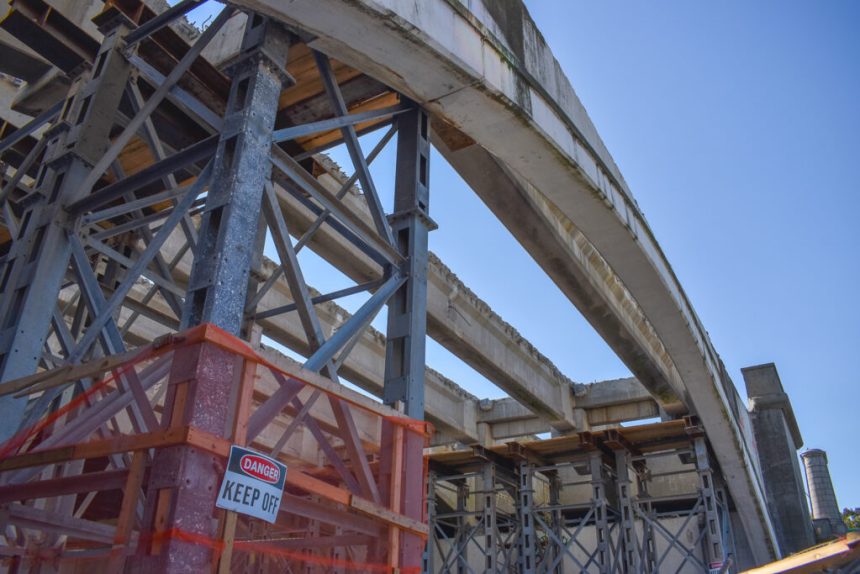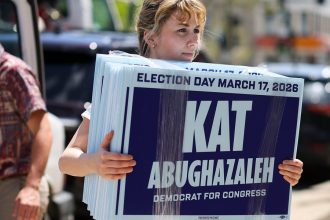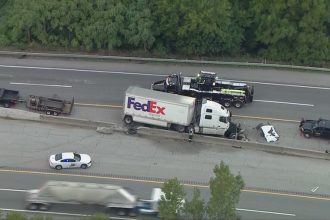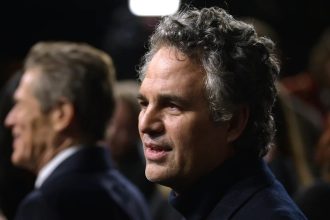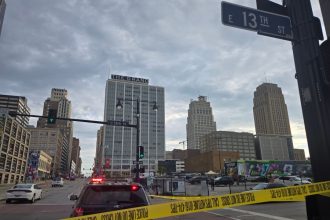The westbound Washington Bridge shown during demolition in October 2024. (Photo by Christopher Shea/Rhode Island Current)
The Washington Bridge audit report cast a harsh spotlight on the state officials and transportation employees who failed to notice or remedy the highway’s deteriorating condition.
Still in the shadows: whoever leaked a portion of the analysis on Instagram on Sept. 26, prompting Rhode Island Attorney General Peter Neronha to publish the entire 64-page report online that night on his office’s website.
“I felt it was better for the real article to be out there than some outlet dribbling it out in dribs and drabs, creating chaos around it,” Neronha said in an unrelated press conference on Sept. 30. “It had gotten to the point where it can be manipulated when that happens. I thought, the best way to handle this is just for you to see the real article.”
Neronha identified the account, “What’s Going On In Rhode Island,” that first published an excerpt of the report. But he did not name the person or people, because there are none listed on the Instagram page, nor its corresponding website and Facebook page. Online forms offer a chance to submit news tips or propose business ads without any contact information. A 2025 business incorporation filing with the Rhode Island Department of State lists a business development service, with an office in Pawtucket, as the resident agent for the Delaware-based LLC.
Rhode Island Current contacted the account through its Instagram page and website. The Instagram page sent an automated reply, but no person followed up.
Despite, or perhaps because of its anonymity, the social media platform has a wide reach: 232,000 followers, with several thousand likes on some posts and dozens of comments. Described as “Rhode Island life,” the account features photos of iconic local landmarks side-by-side with pets available for adoption, recently sold homes, traffic updates and short news reports.
The post that set off the audit’s release came just after 8:30 a.m. on Sept. 26. The first image shows the bridge’s graffiti-splattered underside, with headshots of Gov. Dan McKee and Rhode Island Department of Transportation Director Peter Alviti. Bold red-backed type declares “EXCLUSIVE.”
The accompanying 390-word description promises to share parts of the forensic report over the next few weeks before releasing the entire document.
“No other media outlet in RI has access to the report,” the post stated.
A Sept. 26 post on the What’s Going in Rhode Island Instagram account was the first leak of the now-public Washington Bridge audit report. (Screenshot)
Exclusive? Maybe not.
That same day, reporters at WPRI-TV 12 were working feverishly to authenticate the document, which had been leaked to the station separately. WPRI posted a full story, outlining the findings report and including comments from McKee and other state officials, at 6:39 p.m.
Neronha published the entire document moments earlier, despite his belief that the findings should have been kept private because it’s part of the state’s lawsuit against various contractors who worked on the bridge.
The complaint seeking damages for the state’s losses from the bridge closure is tentatively scheduled to go to trial in late 2027.
“You don’t try your case in the press,” Neronha said. “We’re not going to put 30,000 pages of discovery up on a website for uninvolved experts to opine on, so when it’s time to pick a jury we can’t find anybody who can sit on it. There’s too much at stake here.”
We’re not going to put 30,000 pages of discovery up on a website for uninvolved experts to opine on, so when it’s time to pick a jury we can’t find anybody who can sit on it. There’s too much at stake here.
– Rhode Island Attorney General Peter Neronha
That’s the same explanation McKee and Alviti have shared when asked why the state held on to the highly-anticipated document for more than a year after its completion.
Amid outrage over the bridge’s closure, McKee repeatedly promised a “day of reckoning,” which included unveiling the findings of the state-commissioned forensic audit. He stopped publicly referencing the report soon after the Virginia-based consulting firm finished the April 2024 draft.
But news outlets continued to pester the state about the highly-anticipated analysis, which documents nearly two decades of inspections and repairs to the cantilever bridge — including multiple warnings about its worsening condition that went ignored.
The report doesn’t call out McKee, Alviti, or other state officials by name, though it makes clear that a host of longstanding problems with the cantilever bridge demanded attention.
“Many of the issues highlighted in this report show that program managers, bridge inspectors, and designers should have and could have been aware of problems that were developing,” the report states.

Rhode Island Attorney General Peter Neronha said the leak of the Washington Bridge audit on Instagram forced him to publish the entire report on his website. (Photo by Alexander Castro/Rhode Island Current)
The blame game
The expose prompted swift and mounting criticism against McKee and Alviti, both for the negligence on the bridge, and in keeping an unflattering depiction of their leadership veiled from public view.
Among the critics is the person or people behind “What’s going on in Rhode Island,” which often uses its platform to suggest duplicitous or manipulative behavior on the part of state officials.
Take, for example, a July 25 post. It begins with a straightforward recap of the widely reported news that the state amended its contract for the bridge demolition to expand the scope of work — with an extra $38.4 million cost. Then, it shifts to a series of questions:
-
“Will the demo change order actually cost $38.4 million, or is the real cost closer to $10 million, leaving a potential $28.4 million windfall for the contractor?”
-
“How much of this $38.4 million change order will find its way back into the pockets of the people that awarded the work, or obtained the grants?
-
“What else could we spend this money on to improve our infrastructure?”
There is no evidence cited to back up this line of questioning.
Similarly, the Sept. 26 post about the audit report draws upon four select pages about bridge inspections, along with 2019 concept drawings for a bridge replacement, to pose a series of questions implicating RIDOT and its contractors in the bridge’s degradation.
-
“Why did RIDOT want to replace the bridge in 2019?”
-
“Was VHB legally bound to inform the Barletta/Aetna Joint venture that they had done this work prior to joining them on the phase 2 work?”
-
“Who paid AECOM to lie for the state?”
It ends with a tease of what’s to come.
“We dig deeper next week into this politically motivated cash-cow of a bridge.”
While the full report is now available online — and widely reported by news outlets statewide — the Instagram account continues to post “exclusives” about the findings, including a series of emails between the audit report’s authors posted to its website on Friday.
In the same post, the account also defended its publishing of the materials, noting that the firm hired to audit the bridge was never classified as an expert witness in the state’s case against the contractors.
“AG Peter Neronha is a smart man. He knows what he is doing. He paved the way for the WJE report to be leaked, then quickly added it to his page as soon as it was. Why? The timing wasn’t great for potential political opponents, so….”
Neronha denied that he or his team were involved in the leak during a Sept. 30 interview with WPRO’s Gene Valicenti.
The post continues by criticizing “investigative journalists,” who it claims choose not to run stories because of ties to the state government. A previous post, published Oct. 1, also alleges that local media in Rhode Island get paid by the state government, creating leverage for government officials to kill unflattering stories about them by threatening to pull state funding to their outlets.
This is not correct.

Drawing a line
Traditional journalism and anonymous, social media-based content are different — most importantly in the process that leads up to publishing a story or piece of content.
“If a legitimate news outlet is going to get this document, they’re going to vet it to find out if it’s genuine,” said Dan Kennedy, a journalism professor at Northeastern University and national media commentator. “They’re going to give government officials a chance to comment, and give them a chance to make their case that ‘you shouldn’t report this.’ It’s the ethical thing to do.”
Tim White, Target 12 investigative reporter and managing editor, offered a glimpse of what happened in his newsroom after it obtained the leaked audit report during a Sept. 30 panel event hosted by The Boston Globe’s Rhode Map. While the document sent to the station looked official, White and his coworkers did not want to publish it without confirmation that it was the real thing.
“If your mother says she loves you, check it out,” White said, referring to the beloved adage among reporters on the importance of confirmation.
If a legitimate news outlet is going to get this document, they’re going to vet it to find out if it’s genuine.
– Dan Kennedy, a journalism professor at Northeastern University and national media commentator
The What’s Going On in Rhode Island account did not explain how it got the report, or whether it first sought to verify its authenticity. The first time Neronha was asked to confirm if the leaked document was real was when White called him that afternoon, he said.
The Target 12 story, and subsequent articles by other mainstream news outlets, including Rhode Island Current, feature comments from McKee, and related state officials. What’s Going On in Rhode Island does not indicate in any of its posts that it asked for comment from any state officials or outside experts.
Still, that doesn’t diminish its value in Kennedy’s eyes.
“This anonymous account performed a service in getting this information out there,” he said.
The source not being a traditional journalist or news publication was far less important than the content it provided, and prompted in turn from state officials, he said.
First Amendment protections
While Neronha has made clear he’s not happy that the information was forced out, he acknowledged the leaker didn’t violate court rules.
“If anyone bears the risk here, it’s me,” Neronha said during his appearance on WPRO. “I am the one who put it on our website.”
Indeed, there’s a deep and strong history of constitutional protections for anonymous speech that would make it difficult to sanction the Instagram account, said Justin Silverman, executive director for the New England First Amendment Coalition.
Like Kennedy, Silverman was glad to have the information made public despite state officials’ insistence that it compromised the legal case.
“Generally, those in government are often arguing that there are documents that shouldn’t be released,” Silverman said. “That doesn’t necessarily make it true.”
However, Silverman added that who publishes the information — and more importantly, the motives in doing so — still matters.
“One of the benefits of having that information come from a newsroom is that if the information turns out to be false, we know who to hold accountable,” Silverman said.
Neronha told Valicenti that he thinks he knows who’s behind the Instagram account, which his team has been “monitoring” for over a year.
“But I don’t spend too much time worrying about it,” Neronha said.
SUBSCRIBE: GET THE MORNING HEADLINES DELIVERED TO YOUR INBOX


